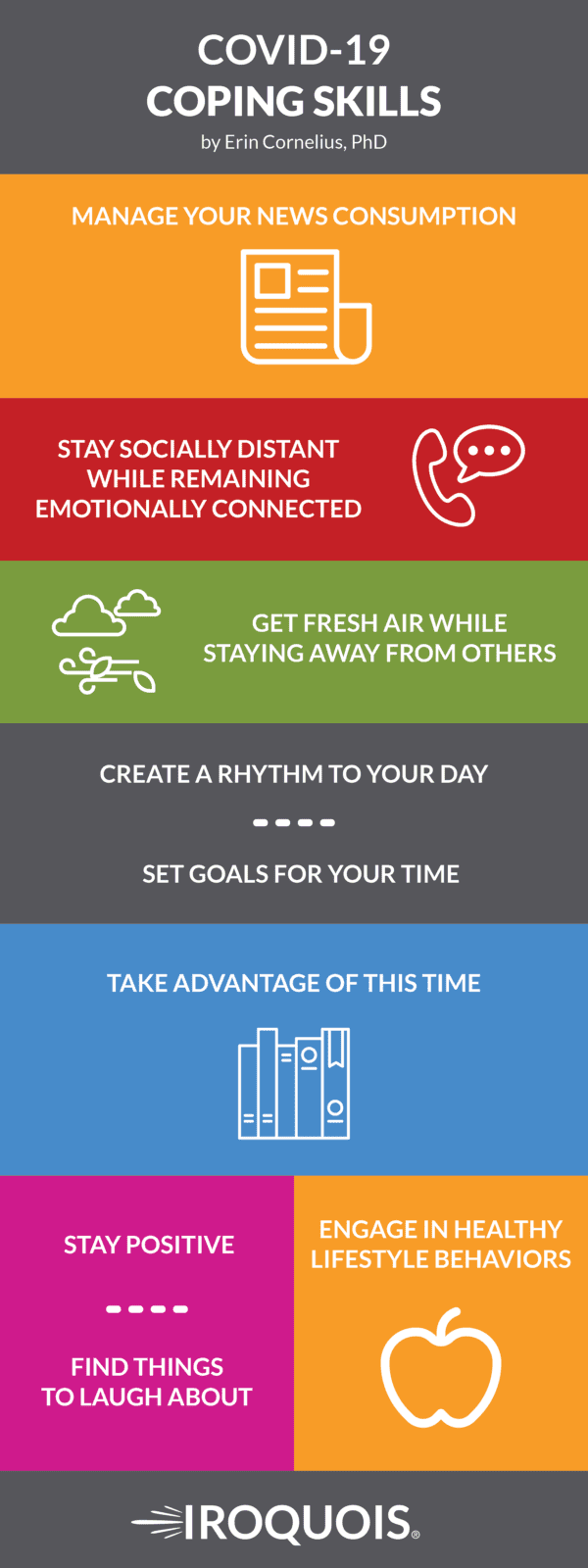Psychologist Dr. Erin Cornelius joins us for a special episode regarding how to manage some of the new feelings that have come along with the COVID-19 pandemic. Are your kids interrupting your meetings? Does your spouse talk loudly on his or her phone calls? Dr. Cornelius will help you work through these new daily norms.
Edwin K. Morris (3s):
Welcome to the trusted advisor podcast brought to you by Iroquois group. Iroquois is your trusted advisor in all things insurance. I am Edwin K. Morris. Today we welcome Dr. Erin Cornelius, graduate from the university of Miami with a PhD in counseling psychology. She is a licensed psychologist with a private practice in orchard park, New York. She sees children and adults for a variety of issues, but tends to focus on anxiety, depression, adjustment disorders, and assessments of ADHD. Prior to working in private practice, Dr. Cornelius spent years doing behavioral health research at some of the nation’s leading hospitals.
Edwin K. Morris (47s):
Telecommuting has been around for probably three decades. What is the real big friction point for people now in this current paradigm?
Dr. Erin Cornelius (56s):
That they had to do it against their wills with no planning whatsoever.
Edwin K. Morris (1m 0s):
So they got hit in the face with a new reality and no time to adjust,
Dr. Erin Cornelius (1m 5s):
And everybody became a telecommuter like their pants were on fire.
Edwin K. Morris (1m 11s):
Okay. So let’s talk about what are the sparks or triggers of frustration with that type of situation?
Dr. Erin Cornelius (1m 19s):
Well, you know, the lack of planning has made everybody feel very anxious, very tense. People are being a little bit shorter with each other. They’re having a lot less patience with each other. Again, you know, having to be super flexible and adapt on the fly as day-to-day things are changing. And as you know, maybe technology isn’t cooperating with you as much as you would like for it to, you know, there are definitely some people who are not as tech savvy as others, and this is a super steep learning curve in a really short amount of time. And that is proving difficult for some people. Working from home has its benefits. It always sounded so great when you weren’t doing it. And now when you’re forced to do it a hundred percent of the time, you can certainly see where some of the cracks are in the design of working from home.
Dr. Erin Cornelius (2m 7s):
And you didn’t really have much time to kind of figure it out.
Edwin K. Morris (2m 9s):
So let’s talk frustrations and I’ll just throw them in three different buckets for, for us to address here, you’ve got internal frustrations and I’ll say, that’s the environment, the current environment, the house, the apartment, the wherever that is. You’ve got the frustration bucket between the employer and the employee relationship because this whole new dynamic creates a whole different level of expectation and concern and trust and just all that sort of thing. And then the third level of frustration bucket is gotta be the outside, the external environment and all this that’s going on with the current threat that forced all this to happen to begin with.
Edwin K. Morris (2m 50s):
How do you cope with each one of those buckets?
Dr. Erin Cornelius (2m 53s):
Well, my biggest piece of advice to everybody is to be flexible and get a sense of humor. You know, we have really got to recognize that if you’re in this for the long haul, that this is a marathon, not a sprint, that you’re going to have to pace yourself, you’re going to have to be patient with yourself and with other people. And you’re going to have to kind of be willing to adapt as the days go on. You’re going to try some stuff and it’s going to go horribly. And you’re going to learn that you’re not going to want to do that again. And then you’re going to try some other things and be pleasantly surprised with how well it worked and you’re going to try and be set up so you do more of it. You know, as far as you know, if I was to talk about some of the internal things that people struggle with the environment.
Dr. Erin Cornelius (3m 35s):
Working from home, all of a sudden you have to have space to do that. And you have to have space for a lot of people to do that, especially if you have a spouse who’s working, and children who are working from home and figuring out a way for everybody to be doing this at the exact same time. You know, I’ve got two kids that are in elementary school and I’ve got a husband who is an essential service that is working from home. I’m a psychologist, I’m an essential service as well. So I am seeing patients all day through teletherapy appointments. So keeping the outside noise out of my office is really important. And I’m doing the best that I can, but let’s be clear.
Dr. Erin Cornelius (4m 17s):
I’m a human and I don’t live in a bubble. So, you know, my child came into my office the other day with a remote control drone stuck to his head, you know, or I had to text my husband from my phone downstairs to say, I understand you’re passionate about what you’re talking about, but I can hear you through the wall. And so trying to navigate those pieces has been tough. And again, keeping a sense of humor about it has been really, really helpful.
Edwin K. Morris (4m 46s):
I would assume most people are just getting angry.
Dr. Erin Cornelius (4m 48s):
Yeah, you know, and I always say, what does that do for you? Right. So anger is a true emotion. Everybody feels it, but hanging onto it and sitting in it, like, what does that do for you? Recognizing, yeah, you’re pissed off about something or, you know, you’re really upset about something, acknowledge it and then choose to let it go. Cause if you sit in it, you’re the one who ends up feeling like crap for the rest of the day about it, not the other person
Edwin K. Morris (5m 13s):
That, that release of that charge sounds easy. Right? Let’s just, well, just let go. But that’s not always the easy part. How would you help somebody if you had to give someone advice on how to release that charge so they can get out of that?
Dr. Erin Cornelius (5m 28s):
For a lot of people, you need to just be validated that you’re okay for being angry about it. You know, that you’re not out of line for feeling the way you feel. So sometimes just having somebody say to you, yeah. You know what? That situation really stinks. Sorry, you went through that. I can understand why you’d be so upset about it and saying, okay, now if you’re trying to figure out how to make your life better, sitting in your anger isn’t going to do much to move you forward. So what do you need to do to help yourself feel better? And for some people it’s, you know, go downstairs to the basement and exercise, or if you can go for a walk in a very socially distanced way, do that, get outside, get some fresh air. I know for me, when I’m angry, I’m a cleaner.
Dr. Erin Cornelius (6m 8s):
So my garage has never looked better than it does right now. Like you could mistake what size garage we have there is so much extra space in that garage right now. And so, you know, finding what it is that you do to cope with your feelings and then acknowledge that you have them, it’s okay to feel that way and then do something to help yourself get through it.
Edwin K. Morris (6m 29s):
All right. So, so on that advice, how do you help someone not watching the 24 hour news feed of all this stuff?
Dr. Erin Cornelius (6m 40s):
News consumption is a huge trigger for people’s anxiety right now. And the reality is, is there is absolutely nothing else happening in the world except for coronavirus. So if you check the news, you’re going to read 27 different stories about coronavirus, and there’s going to be the governor’s news conference and the local County news conference and the federal news conference every single day. And you could really, really get sucked in to paying attention to that stuff. So if you don’t have a good handle on stopping yourself from doing that, I’ve been suggesting to others that you pass the responsibility on to a trusted other, whether it’s your spouse or a friend or somebody else who is paying attention but doing it in a much healthier fashion, and ask them to let you know what you need to know.
Dr. Erin Cornelius (7m 28s):
And the reality is, is what we actually really need to know on a regular basis is if there’s been any change to what the local rules are, and if there’s been any new information to help you keep yourself and your family safer. Other than that, paying attention to council this, and, you know, people’s statements on that, that does not need to be an hourly thing that you do. It’s a huge distraction and nothing about it is going to make you feel better.
Edwin K. Morris (7m 53s):
Well, what would be a resource for someone that feels stuck? What would be something that could be helpful?
Dr. Erin Cornelius (8m 0s):
For somebody that feels stuck? Well, reach out to your support system, you know, call your friends, call your family members. I know in my household, we have gotten a virtual happy hour going with some family members and it has been a really, really great thing for us to do for a few reasons. First of all, we’ve set a time for it to happen. So it has been helpful in putting boundaries on everybody’s workday. You know, the really difficult part about working from home is that there is no physical boundary of when you shut off work, you don’t leave the office. You know, for me, my office is right across the hall from my bedroom, so I can look at it all day long if I wanted to. So I make sure that when I am done with work for the day, I close the door to the office, I also log out of my computer.
Dr. Erin Cornelius (8m 45s):
You know, those who just like close the computer off and they don’t actually sign out of everything make it super easy to just lift up the computer and keep going. Log out of everything, close everything down. So you have to reboot entire thing if you’re going to go do that one more task and ask yourself, does that one more task have to happen right now? Or could that one more task happen tomorrow when I start up my day? You know, phones are mini computers in our pockets. And so we feel like we can work all the time with our cell phones. And it is really important nowadays, to put your phone down, put your phone away, stick it in a drawer. Out of sight, out of mind actually does work. You know, I’ve been trying to plug my phone into a charger and leave it in the other room and charging, and recognize that, you know, I can take a break from it.
Dr. Erin Cornelius (9m 30s):
That is a hard part about working from home is that, you know, we feel like we’re accessible 24 seven cause we’re living in our office, but that does not mean you need to be working 24 seven.
Edwin K. Morris (9m 39s):
So I give you a visual and see if this works for you after listening to what you’re saying and my own experience in this pressure cooker is that, you know, a record player, the old style record player where the needle would just go to the center and just keep going around and round. So it’s almost like, you know what? You can take the needle off the record and just, you don’t have to hear that
Dr. Erin Cornelius (10m 2s):
You got to have some boundaries on this.
Edwin K. Morris (10m 4s):
Relieve yourself of that constant flow.
Dr. Erin Cornelius (10m 8s):
The reality is, is we need to do that in, in the regular world, not just in the coronavirus world, we need to do that in the regular world where we have gotten this like expectation going that everybody’s available at all times. And that we have this need for instant gratification. I mean, I see this in my kids also, you know, they’re growing up in a world where everything is at their fingertips every single minute they want it. I mean, TV is on demand. I grew up in a time where if you wanted to watch a TV show, you have to wait till it came on Tuesday nights at eight o’clock. And if your family was going to be out that night, Oh, you had to set up your VCR recorder and hope to God somebody else didn’t record over your TV show so that you could watch it. You know, nowadays everybody feels like everything needs to happen exactly when they want it to happen, the second they think about it.
Dr. Erin Cornelius (10m 50s):
At our family dinner table, the amount of times somebody says, I wonder if, and then finishes the sentence. And then somebody is so tempted to whip their phone out and Google it. And it’s like, wouldn’t it be great if you could just wonder it and you didn’t have to have the answer to those things. So we have to get better at setting these boundaries on our, our work life and our technological life and kind of get back into what it means to be disconnected from some of these things and working from home makes it that much harder. So you have to be that much more aware of it and put more effort into it.
Edwin K. Morris (11m 22s):
I love this discussion. I’m sure we should do a couple more podcasts on multiple other things that are workplace environment issues other than the current paradigm. We have reached the end of our time and I want to thank you very much for being here and sharing this with us today.
Dr. Erin Cornelius (11m 37s):
You’re welcome, my pleasure.
Edwin K. Morris (11m 40s):
Thanks for listening to this edition of the trusted advisor podcast brought to you by Iroquois. Iroquois, your trusted advisor for all things insurance, and remember get out of the office and sell. I am Edwin K. Morris, and I invite you to join me for the next edition of the trusted advisor podcast.



